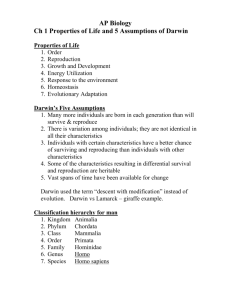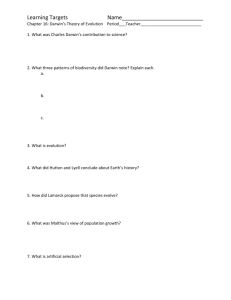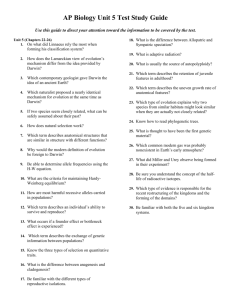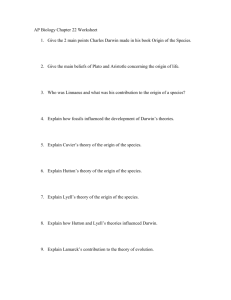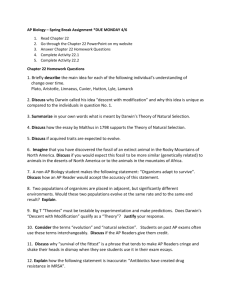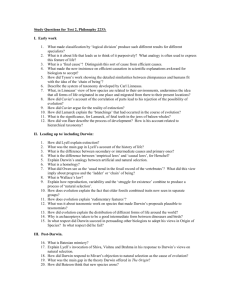Early Views of Humanity & the
advertisement
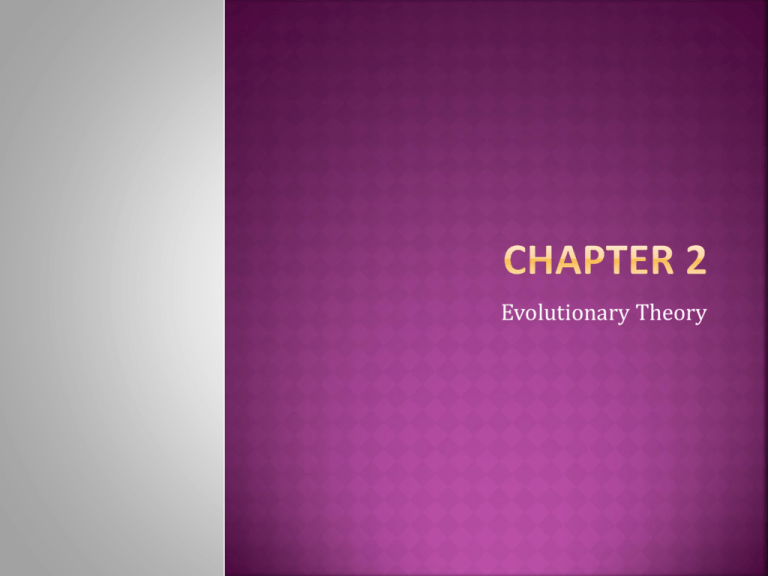
Evolutionary Theory Evolution What is your reaction to this term? Biological sciences Humans and Apes shared last common ancestor 5-8 million years ago. Discoveries came over a long time from a lot of sources Charles Darwin Alfred Russel Wallace Middle Ages Thought processes were static Greek influence – Aristotle Scientific Revolution Europe vs. Arabia and India John Ray (1627-1705) Coined terms species and genus Carolus Linnaeus (1707-1778) Fixity of species George-Louis Le Clerc de Buffon (1707-1788) Change does occur in the universe Erasmus Darwin (1731-1802) Charles Darwin’s Grandfather Jean-Baptiste Lamarck (1744-1829) First to propose evolutionary process Georges Cuvier (1769-1832) Opponent of Lamarck Charles Lyell (1797-1875) Wrote Principles of Geology Thomas Malthus (1766-1834) English clergyman and economist Mary Anning (1799-1847) Discovered a lot of fossils John Baptiste Lamack was the first scientist to produce an explanation for the evolutionary process. He believed that species change was influenced by environmental change. Georges Cuvier introduced the concept of extinction and the theory of catastrophism. The view that the earth’s geological landscape is the result of violent cataclysmic events. Cuvier promoted this view, especially in opposition to Lamarck. Thomas Malthus wrote about the relationship between food supply and population increase. His essay on the Principle of Population led both Darwin and Wallace to the principle of natural selection. Charles Lyell developed the theory of uniformitarianism. Discovered the first complete fossil of Ichthyosaurus, a large fishlike marine reptile. She became known as one of the world’s leading “fossilists” and contributed to the understanding of the evolution of marine life over 200 million years ago. Ideas were formed while serving as a naturalist on the voyage of the HMS beagle. Darwin saw the importance of biological variation within a species. Recognized the importance of sexual reproduction in increasing variation. By 1844, Darwin had complete the work that he would publish fifteen years later. A naturalist who worked in South America and Southeast Asia. Suggested species descended from other species and new species were influenced by environmental factors. Presented paper on evolution and natural selection to the Linnean Society of London jointly with Darwin. Charles Darwin (1809-1882) Discovered first credible mechanism for evolutionary change HMS Beagle Finches and barnacles Alfred Russel Wallace (1823-1913) Developed own theory of natural selection Wrote letter to Darwin Darwin’s formulation included: Potential for reproductive rates that outpace the rate of food supply The presence of biological variation within all species Constant competition among individuals for survival Favorable traits = increase in reproduction Environment determines favorable traits Favorable traits passed to offspring Over long periods of time, successful variations accumulate in populations Geographical isolation may result in new species Peppered moth in the UK Galapagos birds and beak thickness The variation exhibited by dog breeds has been achieved in a relatively short time through artificial selection. 1. 2. 3. 4. A trait must be inherited if natural selection is to act on it. Natural selection can’t occur without population variation in inherited characteristics. Fitness is a relative measure that changes as the environment changes. Natural selection can only act on traits that affect reproduction. No one knew source of variation that Darwin explained Did not know how favorable traits were passed down. Laws of heredity unknown – Mendel had not come on the scene DNA was not discovered until 1953 Offensive to Christians because in conflict with Biblical versions of creation Evolution considered to be a fact by most scientists today Accepted in part by Catholic Church and most Protestants Fundamentalists reject evolution Creationism Intelligent Design Debate topic: Should evolution be taught in public schools? If so should Creationism also be taught?


